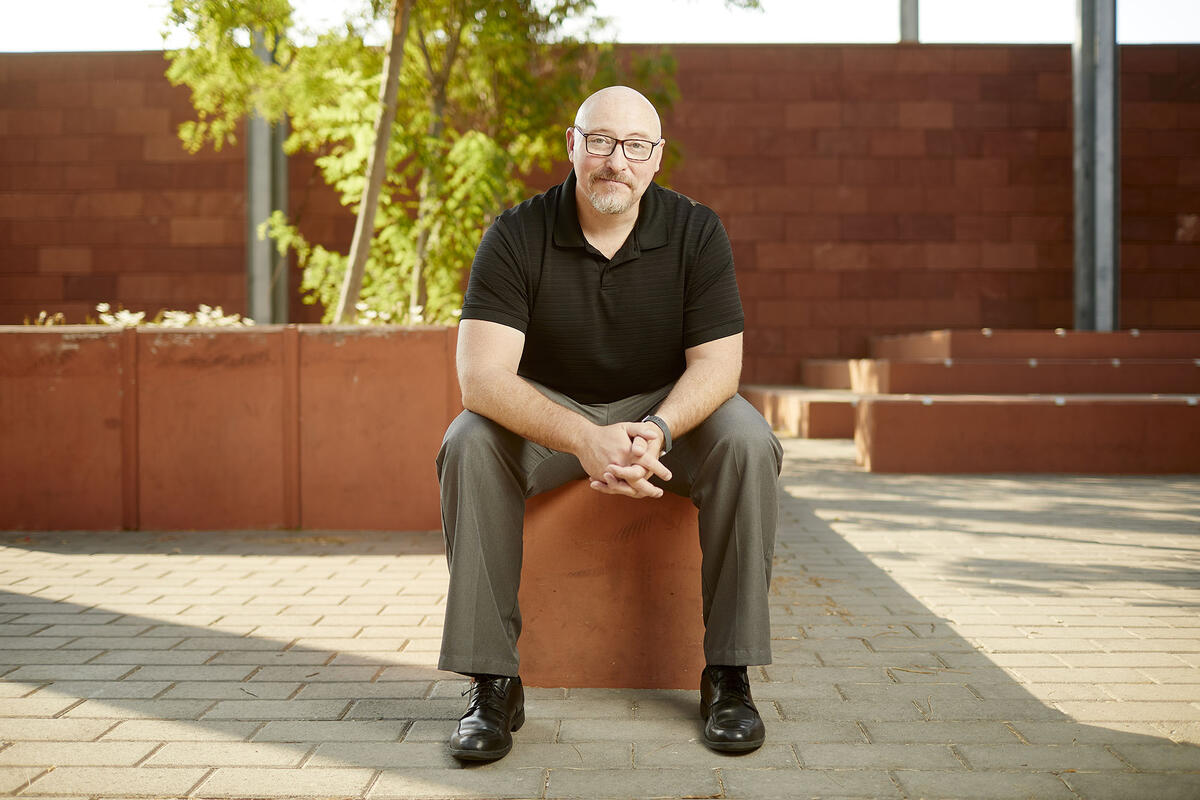As the U.S. winds down military conflicts across the globe, colleges and universities expect an increase in veteran enrollment. Access to the GI Bill and improved career prospects makes enrollment an attractive prospect for veterans, but for many the adjustment to student can be tricky.
A new partnership between UNLV and the U.S. Department of Veterans Affairs (VA) is looking to change that. The Veterans Integration to Academic Leadership (VITAL) program arrived at UNLV in August. The university is one of approximately 90 campuses participating in the program.
James Taylor, a U.S. Marine Corps and U.S. Army veteran, is the VITAL program coordinator. He says the program has the ability to change lives.
“Veterans can call me for anything,” said Taylor, a licensed clinical social worker. “They could have an issue as simple as housing or transportation, or it could be a serious medical issue or a crisis situation. I’m here to help connect them with resources.”
Taylor’s office is housed in the School of Social Work at the Greenspun College of Urban Affairs. He provides one-to-one counseling, hosts group support circles, and is the person to go to when student veterans need help accessing VA healthcare programs, benefits, and referrals to physicians. He also promotes awareness of veteran-specific issues and strengths on campus.
UNLV has for years sought to be a part of the VITAL program, said Ross Bryant, executive director of the UNLV Military and Veteran Services Center.
“An average of 20 veterans die by suicide every day in the U.S.,” Bryant said. “We aren’t immune to that at UNLV. Sadly, we had four student-veteran and two family member suicides from 2012 to 2016. We hope this program will help a veteran who is struggling.”
Having a dedicated, onsite VA employee makes it easier for student veterans to get help immediately, Taylor said. Instead of traveling to a VA site and wading through what is sometimes a cumbersome paperwork process, a student-veteran can make an appointment with Taylor or drop in for his office hours.
“The goal is to provide services that a veteran would get at the VA hospital right here on campus,” Taylor said. “Sometimes when a veteran decides to get care at the VA hospital, it can be a huge headache, and because of that, they sometimes don’t get the help they need.”
A Veteran-Inclusive Campus
UNLV’s student-veteran enrollment is growing, Bryant said, and student-veterans are succeeding here. UNLV’s six-year veteran graduation rate is about 70%, far better than the national average and better than the general student population. He attributes the growth and student-veteran success to expanded resources offered by the Military and Veteran Services Center and a welcoming campus climate.
“Nevada is actually one of the least-populated military personnel states in the country, but we’ve grown veteran enrollment at UNLV from 600 to 1,800 just before the pandemic,” Bryant said. “Our popularity with veterans is based on UNLV being veteran-friendly, and we’re working on being veteran-inclusive.”
In 2019, UNLV was named one of the nation’s best universities by Military Magazine. The university ranked 33rd among four-year institutions in the publication’s 2019 “Best for Vetas: Colleges” edition - up from 62nd in 2018.
Academics to Field Work
Taylor’s presence at UNLV brings another advantage, said Carlton Craig, chair of the School of Social Work. The partnership between the UNLV Military and Veteran Student Services Center, VA, and UNLV School of Social Work heightens the awareness about veterans’ needs and enhances a student veterans’ learning environment. The key to graduating veterans is ensuring their integration into academics is supported. One way to do that is by recognizing the physical and emotional challenges military members face.
Craig said there is a growing need for social workers to understand how military members' personal and professional experiences were shaped by their years in service. Craig said the recent withdrawal of U.S. troops and military staff from Afghanistan will require more social workers to be trained in post-traumatic stress disorder and recovery.
Furthermore, the cohort of veterans who served in Afghanistan will have different ways of coping compared to veterans of other U.S. missions and wars, Craig said.
That’s why social work staff are currently working with Taylor to develop learning opportunities for social work graduate students.
Master’s students in social work are required to complete fieldwork in a clinical or community setting so they receive mentorship and hands-on experiences working alongside trained professionals.
Currently, social work master’s students are enrolled in a practicum at the UNLV Military and Veteran Services Center. The center’s Peer Advising for Veterans Education (PAVE) program provides support to help student veterans navigate challenges on and off campus.
Though mentors can come from any academic discipline, seven of the 15 mentors in spring 2021 were master’s students completing a required School of Social Work practicum.
Social work students are optimal peer advisors for such a program because supporting community members is intrinsic to their future careers. The practicum partnership between PAVE and the School of Social Work allows social work students to put their classroom lessons into practice while also providing campus veterans with access to their uniquely skilled peers.
Craig envisions another curriculum and practicum designed for students who want to counsel active duty military members and veterans. The practicum would require social work students to see clients with Taylor.
“We want to reach veterans early, talk to them early, give them more access to quick counseling, someone qualified like James, because we know this need is growing,” Craig said. “So our hope with all of this is to, first, intervene in a crisis, and second, to help them be successful after the military because we know this is a very resilient, hard-working population.”



